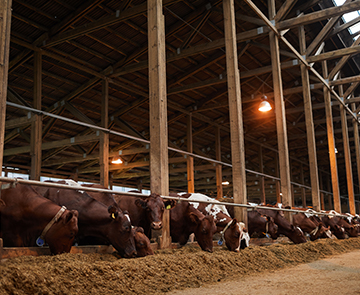Plant Production Program
- Home
- Ras Sudr
- Field of Desert Agriculture
- Plant Production Program

Bachelor’s Degree Plant Production Program
Program Details
| Courses: 48 Courses | Duration: 04 Years | Language: English |
| Seats: 100 Seats (47 Rsvd) | Credit Hours: 138 Cr. Hrs. | Program: Plant Production |
Program Description
The program deals with studying the concepts of basic science in fields of field crops and horticultural and apply appropriate agricultural practices in the desert areas to increase agricultural production and achieve high quality and reduce losses before and after harvest under different production systems and environment while maintaining soil fertility and the use of agricultural resources and inputs with high efficiency to achieve economic return appropriately.
Graduates Attributes
Manage and employ available agricultural resources.
Administer agricultural facilities.
Cultivates under different production and environmental systems.
Use appropriate technologies to address technical and economic problems in agriculture.
Use appropriate propagation methods and can protect transplants/seedlings during growth stages.
Monitor the quality of crops of different types and preserve natural resources and biodiversity.
Use methods that improve the productivity and quality of crops and protect them from disease and pathogens.
Aware of legal, ethical and social issues related to agriculture.
Attends graduate programs and research work.
Propose plans for agriculture according to the quality and characteristics of the soil and water.
Use water and soil sources efficiently.
Learning Outcomes

Knowledge and Understanding.
Intellectual Skills.
Professional and
Practical Skills.
Communication and General Skills.
Job Opportunities
- Egyptian and foreign Universities, research centres and institutes
- Ministry of Environment.
- Ministry of Agriculture and Land Reclamation.
- Ministry of Water Resources and Irrigation.
- Consulting and investors companies for agricultural and land reclamation projects.
- Standards and Metrology Authority.
Getting started
-
Semester 1
7 Courses
Code Course Name LCT LAB TUT OTH CNTCT CH SWL ECTS ABE141 Physics & Agricultural Meteorology 2 3 2 0 5 3 165 6 ABT110 General Chemistry 2 3 0 0 5 3 165 6 MAT111 Mathematics I 3 1 0 0 4 3 150 6 PPT110 Principles of Plant Production 1 3 0 0 4 2 120 4 FST120 Principles of food & dairy sciences 2 3 0 0 5 3 165 6 UC1 University Requirement (1) 2 0 0 0 2 2 90 4 UC2 University Requirement (2) 2 0 0 0 2 2 90 4 -
Semester 2
8 Courses
Code Course Name LCT LAB TUT OTH CNTCT CH SWL ECTS ABE120 Principles of Agricultural Engineering 2 3 0 0 5 3 165 6 APT110 Principles of Animal Production 1 3 4 2 120 4 PPT111 Plant Morphological & physiological 2 3 0 0 5 3 165 6 PBC201 Biochemistry I 2 2 0 0 4 3 150 6 UC3 University Requirement (3) 2 0 0 0 2 2 90 4 UC4 University Requirement (4) 2 0 0 0 2 2 90 4 UC5 University Requirement (5) 2 0 0 0 2 2 90 4 UE1 Elective University Requirement (1) 2 0 0 0 2 2 90 4 -
Semester 3
7 Courses
Code Course Name LCT LAB TUT OTH CNTCT CH SWL ECTS ABT240 Applied Bio-Statics 1 3 0 0 4 2 120 4 CSE013 Introduction to Information systems & technology 2 1 0 0 3 2 105 4 PPT212 Principles of the Desert Environment 2 3 0 0 5 3 165 6 PPT240 Principles of Soil Science 2 3 0 0 5 3 165 6 CHE331 Analytical Chemistry 2 2 0 0 4 3 150 6 ENG111 English 2 2 0 0 0 2 2 90 4 UC6 University Requirement (6) 2 0 0 0 2 2 90 4 -
Semester 4
8 Courses
Code Course Name LCT LAB TUT OTH CNTCT CH SWL ECTS PPT213 Desert Areas Flora 2 3 0 0 5 3 165 6 PPT230 Production of Drought and Saline Tolerant Fruit Trees 2 3 0 0 5 3 165 6 ABT220 Principles of Genetics 1 3 0 0 4 2 120 4 ABT 230 General Microbiology 1 3 0 0 4 2 120 4 CTP211 Surveying 2 0 1 3 6 3 180 6 UC7 University Requirement (7) 2 0 0 0 2 2 90 4 UE2 Elective University Requirement (2) 2 0 0 0 2 2 90 4 UE3 Elective University Requirement (3) 2 0 0 0 2 2 90 4 -
Semester 5
7 Courses
PPT314 Fruit Physiology 1 3 0 0 4 2 120 4 PPT321 Production of Drought and Salinity Tolerant Field Crops 2 3 0 0 5 3 165 6 PPT331 Protected Agriculture Technology 2 3 0 0 5 3 165 6 PPT341 Plant Nutrition Under Desert Conditions 2 3 0 0 5 3 165 6 PPT332 Propagation and Production of Transplants 1 3 0 0 4 2 120 4 E1 Elective Course – Pool (1) 2 3 0 0 5 3 165 6 E1 Elective Course – Pool (1) 2 3 0 0 5 3 165 6 -
Semester 6
7 Courses
ABE313 On-Farm Irrigation and Drainage Engineering 1 3 0 0 4 2 120 4 PPT315 Principles of Plant Breeding for Environmental Stresses 2 3 0 0 5 3 165 6 PPT316 Plant Tissue Culture 1 3 0 0 4 2 120 4 PPT335 Postharvest Technology of Horticultural Crops 2 3 0 0 5 3 165 6 PPT336 Ornamental plants and woody trees 2 3 0 0 5 3 165 6 E2 Elective Course – Pool (2) 2 3 0 0 5 3 165 6 E2 Elective Course – Pool (2) 2 3 0 0 5 3 165 6 -
Semester 7
2 Courses
Code Course Name LCT LAB TUT OTH CNTCT CH SWL ECTS PPT491 Field training 0 0 30 30 5 600 10 PPT492 Graduation project 0 0 0 2 27 4 500 8 -
Semester 8
5 Courses
Code Course Name LCT LAB TUT OTH CNTCT CH SWL ECTS PPT418 Disease and Pest of Agricultural Crops 2 3 0 0 5 3 165 6 PPT424 Postharvest technology of field crops 2 3 0 0 5 3 165 6 PPT425 Technology of Desert Agriculture 2 3 0 0 5 3 165 6 E3 Elective Course – Pool (3) -3 Courses for Special modern desert agriculture Sub Program 6 9 0 0 15 9 495 18 E4 Elective Course – Pool 4) -3 Courses for Cultivation of medicinal and aromatic plants Sub Program 6 9 0 0 15 18 495 18

Dr. Ibrahim Ali Ahmed Abouelsaad
Assistant Professor ibrahim.abouelsaad@ksiu.edu.egMahmoud Kamel Elsayed Bakry
Teaching Assistant mohammed.elbasuini@ksiu.edu.egFAQs
The program deals with studying the concepts of basic science in fields of field crops and horticultural and apply appropriate agricultural practices in the desert areas to increase agricultural production and achieve high quality and reduce losses before and after harvest under different production systems and environment while maintaining soil fertility and the use of agricultural resources and inputs with high efficiency to achieve economic return appropriately.
Testimonials
 Student
Student When we first came here, the academic staff was there to welcome us to the university and ease our transition with seminars and orientations. There was also an academic advisor that helped me during the course registration.
Related Courses
The program deals with studying biological diversity and the conservation of genetic resources.
- 08 Sesmsters
- 138 Cr. Hrs.
The program deals with studying the concepts of basic science in the fields of agricultural engineering for new special desert crops.
- 08 Semesters
- 138 Cr. Hrs.
The program deals with studying the basic concepts of animal, poultry and fish production in the desert areas.
- 08 Semesters
- 138 Cr. Hrs.
Latest Blog
-

Translation and Simultaneous Interpreting in German students Earn 5 DAAD Scholarships
Apr 18, 2024 -

King Salman International University announces Bid No. (2) for the year 2024, with closed envelopes, to rent a space to work in a pharmacy activity
Apr 18, 2024 -

Bid No. (1) for the year 2024, with closed envelopes, to rent a space to work as a medical analysis laboratory for a one-day hospital
Apr 18, 2024



